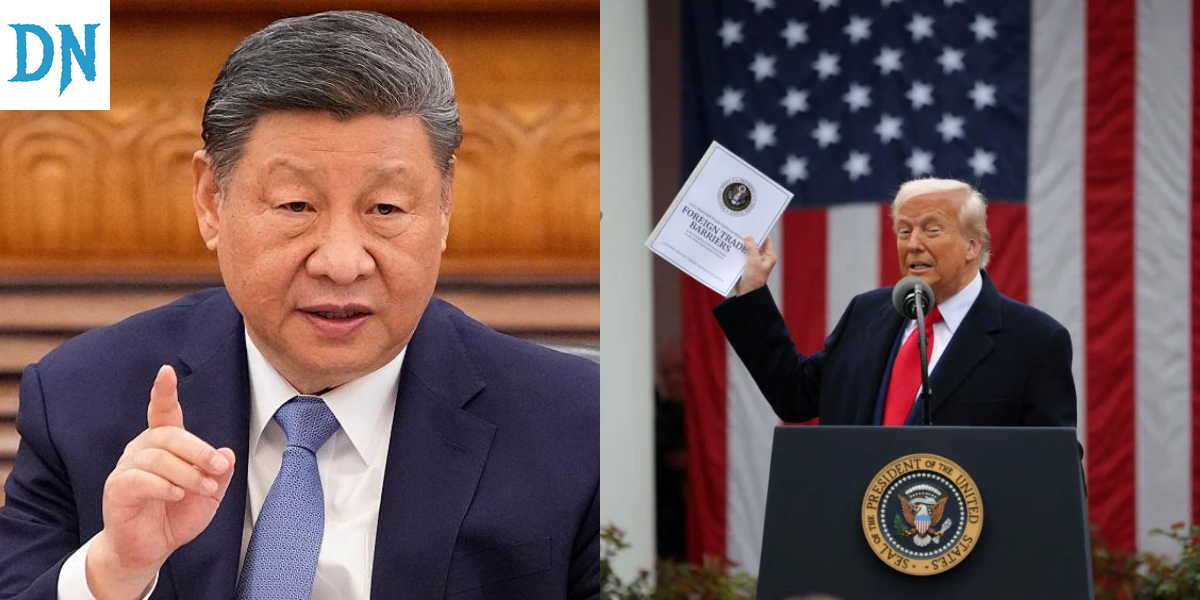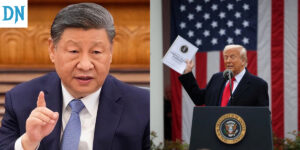China Imposes 34% Tariff on U.S. Imports in Retaliation for Trade War
China Imposes 34% Tariff on U.S. imports starting April 10 in retaliation for Trump’s trade war, escalating tensions between the world’s largest economies. Beijing also adds U.S. firms to its export control and unreliable entity lists.
Beijing Strikes Back as U.S.-China Trade Tensions Rise(China imposes 34% tariff on U.S. imports)
China has officially announced a 34% tariff on U.S. imports, effective April 10, in response to new trade restrictions imposed by the U.S. This aggressive move marks another escalation in the ongoing U.S.-China trade war, significantly affecting businesses, stock markets, and global supply chains.
According to China’s State Council Tariff Commission, this decision is a countermeasure against U.S. President Donald Trump’s recent tariffs, which included an additional 34% levy on Chinese imports. This tit-for-tat approach has left international investors and economists worried about the potential long-term impact on global trade. (Trending News)
What Does the 34% Tariff Mean for Global Trade?
The latest breaking news from Beijing confirms that these tariffs will apply to all U.S. goods entering China, unlike previous retaliatory measures that targeted specific industries such as agriculture and technology. This means that American exporters will face higher costs, and Chinese businesses that rely on U.S. imports will need to find alternatives.
Furthermore, China has announced new export controls on rare-earth minerals, crucial for the production of semiconductors, electric vehicles, and defense equipment. These minerals—including samarium, gadolinium, and terbium—are essential for advanced manufacturing, and limiting their supply could severely impact U.S. industries. (Top 10 News Today)
Market Reaction: Stocks Plunge as Trade War Deepens
The financial markets reacted sharply following the announcement. On Friday, Dow Jones futures plummeted by over 1,000 points, while the S&P 500 and Nasdaq Composite both dropped by more than 2.5%.
Global markets also suffered, with European and UK stocks facing their worst trading day in years. Analysts fear that these tariffs could trigger a recession-like slowdown, as businesses struggle with rising costs and disrupted supply chains. (Latest News Headlines)
How This Affects American and Chinese Businesses
Businesses in both countries are expected to feel the economic strain. For U.S. companies exporting goods to China, the new tariffs make their products significantly more expensive, potentially reducing sales. Industries most affected include:
- Agriculture – Soybean, pork, and sorghum exports face heavy restrictions.
- Technology – U.S. chipmakers rely on Chinese manufacturers, causing potential supply chain disruptions.
- Automotive – Higher costs for car manufacturers due to limited access to Chinese rare-earth minerals.
Chinese companies that rely on U.S. raw materials and technology are also scrambling to find alternative suppliers, potentially shifting trade relations towards Europe and other Asian nations.
China Adds U.S. Companies to ‘Unreliable Entity List’
As part of its retaliation, China has added 11 U.S. firms to its “Unreliable Entity List”, restricting their business operations in the country. Notable names include Skydio Inc. and BRINC Drones, which have been linked to arms sales to Taiwan.
Additionally, China launched anti-dumping investigations into U.S. and Indian medical CT X-ray tube imports, signaling further trade barriers ahead. This investigation could impact medical device manufacturers, potentially driving up healthcare costs globally.
For an in-depth analysis of China’s trade policies and their global impact, check out our report: China’s Trade War Impact.
The Future of U.S.-China Trade Relations
With total tariffs now reaching 54% on Chinese goods entering the U.S., analysts predict prolonged economic strain for both countries. While diplomatic negotiations remain uncertain, the ripple effects will continue to shape the global economy in 2025 and beyond.
China has urged the U.S. to immediately withdraw unilateral tariff measures, but Washington has made no indication of backing down. If tensions continue, we could see further restrictions, global supply chain shifts, and rising consumer costs worldwide.
To stay updated on this developing story and more breaking news, visit our Latest News Section.














Post Comment